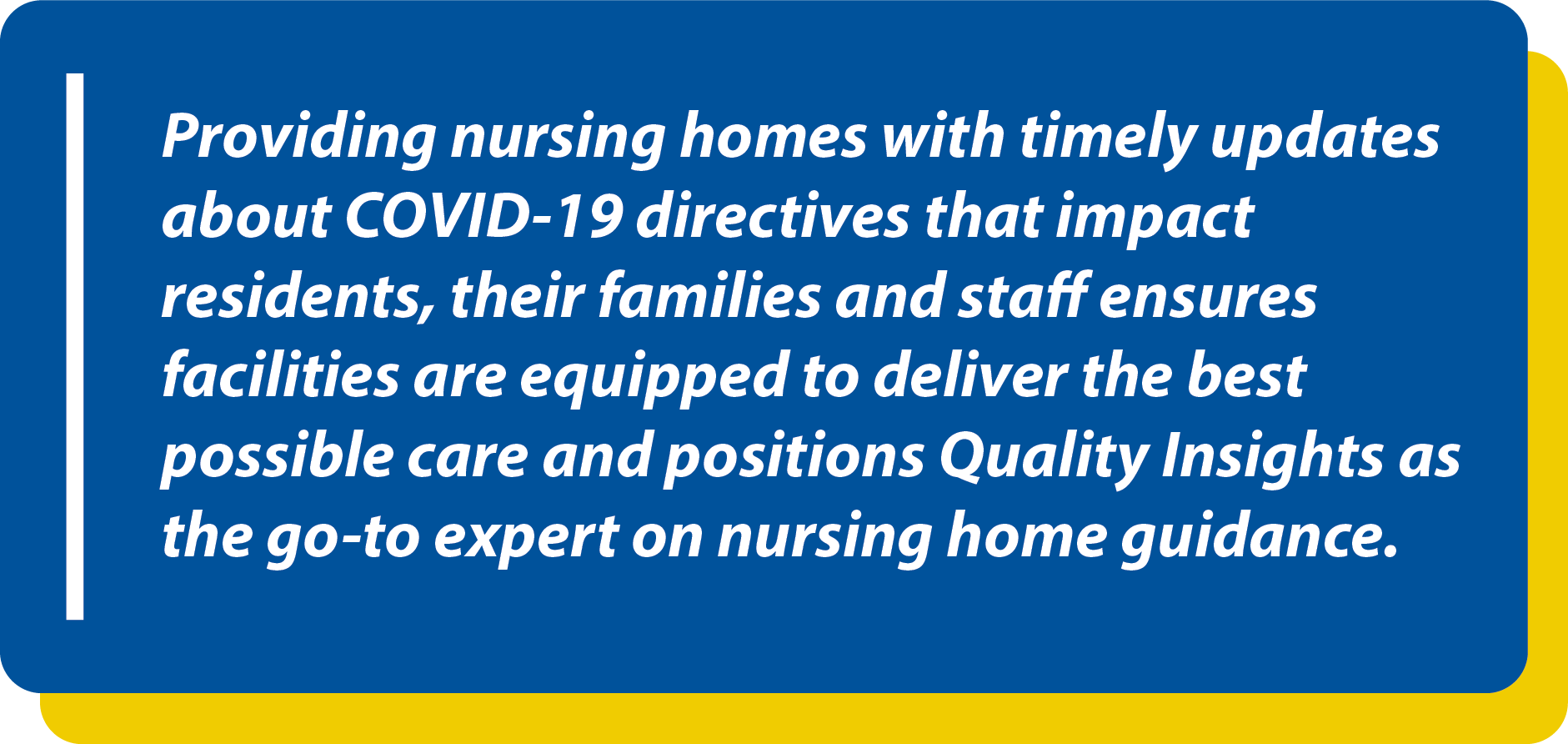Keeping nursing home staff updated on the latest COVID-19 guidelines and directives is critical for continued improvement of resident and staff vaccination rates for the COVID-19 vaccine and booster. Quality Insights, a Centers for Medicare & Medicaid Services (CMS) Quality Innovation Network-Quality Improvement Organization (QIN-QIO) is using a multi-faceted approach to educate its staff and update nursing homes in its two-state region about the latest COVID-19 vaccination and booster guidance.
All updates from state health departments, CMS, the Centers for Disease Control and Prevention (CDC) and the CDC’s National Healthcare Safety Network (NHSN) are shared directly with staff as they are received. Quality Insights discusses these updates to ensure everyone understands the changes and can answer questions. New staff attend a weekly training, and internal audits ensure content covered during the training is being used by staff in their interactions with nursing homes. Providing nursing homes with timely updates about directives that impact residents, their families and staff ensures the facilities are equipped to deliver the best possible care and positions the QIN-QIO as the go-to expert on nursing home guidance.

In addition to sharing and discussing updates internally, Quality Insights ensures all QIO staff, through ongoing networking, have relationships with state departments of health, the CDC and other state and local partners. Many staff also are members or on the boards of state-based organizations that work closely with nursing homes (i.e., the Pennsylvania Association of Directors of Nursing). Participating in partner initiatives helps Quality Insights maintain these relationships and align its communication efforts to avoid duplication.
Quality Insights has had to be creative in their efforts to reach busy nursing homes with this information. Weekly webinars, Office Hours live chats, and emails have been central to this effort. The Quality Insights team learned that offering weekly webinars doesn’t necessarily mean nursing home staff have time to attend. To ensure facilities have opportunities to access webinar content, the communications team records the event and creates video blogs and podcasts for nursing homes to access at their convenience. Office Hours live chats also are offered weekly giving nursing homes the opportunity to ask questions. Quality Insights also created the Last-Minute Lowdown (LML) email. Sent weekly on Fridays, the LML summarizes news and resources specific to immunizations, long-term care and skilled nursing facilities. It also includes the recording of that week’s webinar and answers to questions addressed during the Office Hours live chats.
Quality Insights tracks webinar registration and attendance, video blog and podcast views, and open and click-through rates for the LML. This data is used to refine Quality Insights’ strategy for reaching nursing homes with updated information about COVID-19 vaccine and booster guidance. For example, in early 2022, the number of attendees participating in Quality Insights’ weekly webinars was in the single digits. To improve attendance, Quality Insights began sending email reminders one hour before a scheduled webinar. This led to significantly more registrations and double-digit attendance.
Webinar attendance data also is used to select topics Quality Insights believes will be of interest to its audience. For example, the QIN-QIO noticed that for its March 30, 2022 webinar highlighting updates to COVID-19 guidance for nursing home visitation and testing, attendance tripled. Quality Insights theorized that its audience might be interested in webinars that include discussion on policies and guidelines. When CMS released new guidance on nursing aide training requirements, Quality Insights hosted a webinar on the changes. The event drew the second-highest attendance behind the QIN-QIO’s March 30 webinar.
Quality Insights also uses unique URLs to determine which communications channels drive the most attendance. The QIN-QIO has found that most attendees come from the email reminders sent shortly before a webinar. Others often come from the LML or from older e-blasts. At the end of each webinar, Quality Insights reminds attendees about the LML and the information and resources it provides. Between March 30 and May 20, 2022, 12 webinar attendees who were not previously subscribed to the e-blast asked to be added at the conclusion of a webinar. Most of these attendees registered via an LML link which they likely received from a colleague who forwarded the message. This demonstrates that the QIN-QIO’s emails and webinars are becoming a new source for audience growth and engagement.
Between January 9 and May 15, 2022, all nursing homes in the two-state region served by Quality Insights that were referred to the QIN-QIO for assistance have seen a 21.7 percent net increase in resident vaccination/booster rates as compared to nursing homes in that region that were not referred to the QIN-QIO for assistance. In addition, the percentage of fully vaccinated and boosted residents in nursing homes in Quality Insight’s two-state region referred to the QIN-QIO for assistance increased by 31 percent compared to fully vaccinated and boosted residents in nursing homes not referred to the QIN-QIO which increased by only seven percent.
Quality Insight’s Regional Nursing Home Resident COVID-19 Vaccination/Booster Rates Including Referrals from January 9 through May 15, 2022.The graph compares vaccination rates of CMS-referred facilities (orange) with never-referred facilities (blue) and only includes referrals made between January 9 and May 15, 2022. Never-referred facilities did not meet initial criteria for booster referral because CMS focused on facilities with significantly lower rates.
|
|---|
This material was prepared by The Bizzell Group (Bizzell), the Data Validation and Administrative (DVA) contractor, under contract with the Centers for Medicare & Medicaid Services (CMS), an agency of the U.S. Department of Health and Human Services (HHS). Views expressed in this material do not necessarily reflect the official views or policy of CMS or HHS, and any reference to a specific product or entity herein does not constitute endorsement of that product or entity by CMS or HHS. 12SOW/Bizzell/DVA-1126-07/18/2023


